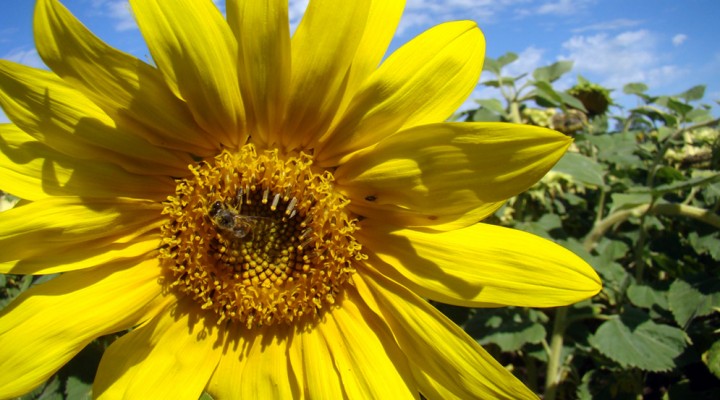TECHNOLOGY TRANSFER
Researchers and companies: union makes science
Scientists at CONICET and Syngenta work jointly on the study about pollination impact on the current agricultural system.
There is increasing attention on pollination, the process in which pollen is transferred from the masculine part of the flower towards the feminine one, thereby enabling egg fertilization and seed growth. This process is carried out by different vectors such as insects, water or wind, and it is one important factor for the performance of the agricultural production. About three quarters of the cultivated species benefit in different ways from the action of these insects, but so far it was believed that some strategic crops such as soy, sunflower or rape almost did not depend on insect’s pollination task.
For three years, Syngenta, a company devoted to the sale of seeds and products for crop protection, has kept a work bond with CONICET through four research projects on strategic themes for the agricultural sector focused on the study of pollination impact on the current agricultural model and its derivation toward sustainable productivity.
“The project was conceived due to the interest of the company in how agroecosystems in Argentina are linked to native pollinators and honey bees, and their effect on different crops. For this reason, CONICET organized a workshop in Buenos Aires and called the researchers who study pollination. After that, different projects were presented and ours was among the four that were selected. We try to understand how the configuration of the natural vegetation affects the performance of the crops that interact with pollinators”, Galetto explains. He is a CONICET senior researcher at the Multidisciplinary Institute for Plant Biology (IMBIV, CONICET-UNC in Spanish) and one of the scientists involved in the projects with Syngenta.
Through the Technology Transfer Office, the Council provides researchers and fellows with the possibility of working with activities linked to the private sector problems. The agreement called ‘Researchers in companies’ promotes the connection between the scientific and technological public system and the socio-productive sector so as to add value to the company, increase skilled jobs, and benefit the economy of the country through that transfer.
“Syngenta promotes biodiversity, protecting and improving the habitat of the pollinators. Agricultural landscapes often lack diversity and abundance of flowers that need the pollinators so for this reason the company launched the programme Operation Pollinator, which aims at increasing the number of pollinators assessing different combinations of native vegetation with predominance of floral spaces” Martín Fresco, manager of Public Affairs of Syngenta, affirms.
Galetto comments that strategic crops, even without pollinators, produce fruits and seeds, but with pollinators the performance would improve. When the project was created, scientists believed that more diverse pollinators would lead to better performance in most flowering crops; so they made the partial analysis of the information that would verify this hypothesis.
The study was conducted in the outskirts of the cities of Córdoba, Rosario, Mar del Plata and Bahía Blanca in diverse landscapes with different degree of number of vegetation, another factor that was analyzed.
“We studied large areas of soya been and sunflower in those places and we also found crops linked with pollinators like rapeseed, chia, vicia faba, and kiwi fruit; where we could research into the same subject. Soy been is supposed to pollinate itself so it does not depend on pollinators, which barely go to the flowers. However, we found that in some regions pollinators often do it. When we isolated some plant plots from the pollinators, the production was reduced. The same happened with the sunflower, vicia faba and chia. In kiwi crops, trained workers carry out manual pollination to improve the performance, what turns out to be expensive due to the manual labour cost. Nevertheless, environments with biodiversity can provide pollinators, thus enhancing the performance of this crop and lowering production costs. We conducted some tests in which we added beehives to the most economical crop for the producer; and it seems that the bees are working efficiently”, the researcher adds.
Furthermore, the scientist affirms that by assessing the interaction between crops and pollinators, it is possible to test that the performance increases; so by organizing the territory the producers will benefit because they will have more fruits and seeds in the same cultivation units. Furthermore, the organization of the territory to host pollinators improves the preservation of biodiversity.
“The project has a double perspective: to show that the preservation is not antagonistic towards production and one rational production has more returns in economic terms. Besides, this initiative preserves strategic natural resources such as the pollinators, which favor the promotion of crops”, the scientist states.
Finally, Galetto affirms that the second stage of the project is going to include interdisciplinary collaborations with chemists so as to test if pollination affects the quantity and quality of oil in some crops.
“Joint work with the scientific community was really rewarding for Syngenta. We have never experienced this type of agreements; and joint work with the researchers has helped us to understand different problems that affect the private sector apart from providing us with new opportunities to explore the future. Thanks to the experience with CONICET, we feel ready to develop bonds through other agreements so as to continue studying pollinators”, Fresco concludes.
By Cecilia Leone.
